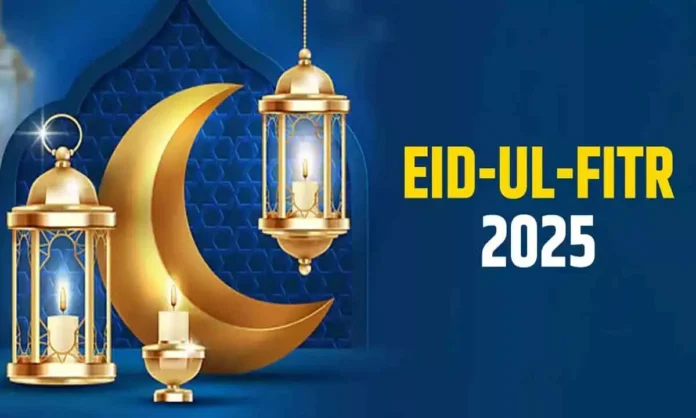Eid-ul-Fitr, also known as Ramzan Eid or Meethi Eid, holds immense significance for Muslims around the world. It marks the end of Ramadan, a month dedicated to fasting, prayers, and self-reflection. The festival, celebrated on the first three days of Shawwal, the 10th month of the Islamic lunar calendar, brings families and communities together in joyous celebrations.
In 2025, the holy month of Ramadan began on March 2 in India after the sighting of the crescent moon on March 1. In Gulf countries, including Saudi Arabia and the UAE, Ramadan started a day earlier, on March 1. As per Islamic tradition, Eid-ul-Fitr is observed after the sighting of the new moon, signifying the conclusion of Ramadan’s fasting period. In India, Pakistan, and Bangladesh, Eid is expected to fall on April 1 or April 2, depending on moon sighting reports. In Saudi Arabia and other Middle Eastern countries, the festival will likely be celebrated a day earlier.
Muslims around the world eagerly anticipate this festival, which begins with the special Eid prayer at mosques and Eidgahs. Devotees dress in new clothes, give charity known as Zakat al-Fitr, and share festive meals with loved ones. Traditional dishes, including biryani, kebabs, and sweet delicacies like sheer khurma, add to the joy of the occasion. Families gather to offer gratitude, exchange gifts, and seek blessings for a prosperous year ahead.
Eid-ul-Fitr is not just a religious observance; it is also a time for unity and generosity. Acts of kindness, including distributing food and clothes to the less fortunate, remain an integral part of the celebrations. Many Muslim-majority countries declare public holidays, allowing people to travel and reunite with family members. Streets light up with decorations, markets brim with festive energy, and social media buzzes with Eid greetings from leaders and celebrities.
While the spirit of Eid remains the same worldwide, regional traditions add unique flavors to the celebrations. In India and Pakistan, families prepare elaborate feasts, visit relatives, and exchange “Eidi”—money given as a gift to children. In the Middle East, grand feasts and community gatherings mark the festival, with public events and entertainment arranged for residents. In Western countries, Muslim communities come together for communal prayers and celebrations, often hosting multicultural events to share the essence of Eid with friends from different backgrounds.
The excitement surrounding Eid-ul-Fitr extends beyond its religious significance. It serves as a reminder of discipline, gratitude, and compassion, values cultivated during the fasting month of Ramadan. As families prepare for the festivities in 2025, the anticipation of moon sighting continues to build, bringing a sense of unity among Muslims across different continents.
With its deep-rooted traditions and emphasis on togetherness, Eid-ul-Fitr remains one of the most cherished Islamic festivals, embodying the spirit of faith, joy, and generosity.
Eid-ul-Fitr also highlights the importance of forgiveness and reconciliation. Many take this opportunity to mend strained relationships, seek forgiveness from family and friends, and embrace a fresh start. The festival encourages a spirit of unity, reminding people to extend kindness and generosity not only within their own families but also to those in need.
As part of the celebrations, many Muslim communities organize public feasts, charity drives, and cultural programs. Mosques and community centers hold special prayers and gatherings where people come together to reflect on the lessons of Ramadan and express gratitude for their blessings. The practice of giving Zakat al-Fitr, a form of charity mandatory for all eligible Muslims, ensures that even the underprivileged can partake in the celebrations.
In modern times, social media plays a significant role in connecting people during Eid. Families separated by distance share virtual greetings, video calls replace traditional visits, and online platforms become a hub for exchanging Eid wishes. Many businesses and brands also acknowledge the festival by offering special Eid discounts, themed packaging, and greetings tailored to Muslim customers.
Despite regional differences in how Eid is celebrated, the core values remain the same—faith, gratitude, and community. Whether in a bustling metropolis or a quiet village, the joy of breaking fast together, dressing up in festive attire, and sharing meals with loved ones is a universal experience. The festival brings a sense of closure to the spiritual journey of Ramadan while marking the beginning of renewed hope and positivity for the months ahead.
As the world prepares for Eid-ul-Fitr 2025, excitement grows over the moon sighting that will officially confirm the date of celebration. The anticipation, the last-minute shopping, and the smell of delicious food filling homes create an atmosphere of warmth and festivity. Whether through grand feasts, heartfelt prayers, or simple acts of kindness, Eid-ul-Fitr continues to be a cherished occasion that unites Muslims across the globe in the spirit of joy and gratitude.

